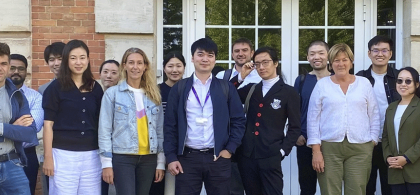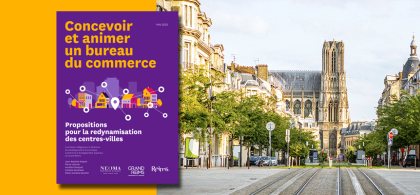
Academic excellence
Gilbert Cette, French economist who joined the NEOMA faculty in 2022, was appointed Chairman of the Pensioner Orientation Board of the French Council of Ministers
Created in 2000, the Pensioner Orientation Board is an independent body of expertise and consultation whose mission is to analyse and monitor the medium- and long-term outlooks of the French pension system. It has 41 members including legislators, representatives of professional organisations and unions, pensioners and families, members of the administration anChampagne: a unique study identifies the levers to support the sector’s sustainability transitiond experts.
A major player in the public debate linked to economic challenges, Gilbert Cette also chairs the group of experts studying the minimum wage. He is a sought-after expert on issues concerning the job market, growth and productivity.

“Research must have an impact on all the stakeholders in the ecosystem”
In September 2023, Serge Da Motta Veiga took the reins of the NEOMA Research department. One year later, he is appointed Associate Dean for Faculty. He offers his assessment and shares with us his perspectives on the school’s major projects.
You took the position of head of research at NEOMA Business School in September 2023. What have been your major projects over the past year?
Since I have come to the school, the objective has been to continue to give more public value to the school’s research and academic excellence, particularly through our publications. That is very important to us. We have also optimised the operational process to facilitate the research activities of our faculty. And above all, our biggest project is the impact of our research, not only on the students at the school but also on all the stakeholders in our ecosystem.
Let’s start with increasing the accessibility to the research. What are your goals?
We’ve identified a significant number of quality publications. My ambition is to emphasise the publications that are in line with our strategy, particularly those on subjects such as sustainable development, sustainable finance, sustainable supply chain and artificial intelligence. These fields are a central component of our recent recruitments.
Making research accessible to the general public is important to you. What are some of the means used to do that?
At NEOMA, our commitment to the dissemination of research involves a media coverage strategy organised by our scientific mediation committee. We publish articles on our website that can be widely understood, encourage our faculty to engage with different forms of media and we cooperate with key partners such at the FNEGE and The Conversation. To optimise this effort, we recruited a research dissemination director whose mission, among other things, is to map out the different areas of expertise of our faculty, which has the largest number among French business schools. This comprehensive approach aims to make our research more accessible to the general public, thus contributing to enriching societal discussions and strengthening the link between our institution and society as a whole.
Your second major objective is to improve the impact of the research. What does that mean?
Our professors conduct various research projects, but once their articles have been published, the project is over. But publication should not be considered as an end in itself. Having their research results more widely known, defining the communication strategy is also a part of the researcher’s work. The impact should no longer just be academic but societal. It should no longer only be measured by indicators such as its quotation rate. It’s about making sure that the research activities and their results have a positive impact on society as a whole, beyond just academia. For example, we want to see this research have an impact at the school and on the students. To do this, we are working increasingly on creating a link with the courses.
We are also seeking to create synergies with all the stakeholders in the school’s ecosystem. Since November 2023, we have organised with companies “NEOMAtinées “ talks that give researchers and these companies the opportunity to discuss and start up collaborations. The goal is for our professors to provide the companies with solutions to their problems. We have focused one talk on supply chain, one on sustainable finance, one on inclusive leadership and one on third places.
This year we have already planned three symposiums on important subjects for the school such as artificial intelligence, healthcare, and the bioeconomy. It’s still too early to talk about concrete plans, but we started thinking about organising these events. And we want to speed up the process, organise bigger events and establish research chairs.
Is NEOMA trying to establish connections with other major economic players and public institutions?
Absolutely. It’s important to have professors designated as experts in major public institutions. For example, Gilbert Cette is president of the Pensioner Orientation Council. We also have strengthened our partnerships with local municipalities (the Normandy Region, the Rouen Normandy Metropole, the Grand Est Region, and the Grand Reims) who financially support many of our projects. We even recruited a new person to monitor these partnerships on our Reims campus.
Key NEOMA Research Figures
The School showed a continued growth in scientific output impact between 2020/2021 and 2023/24.
Areas of Excellence
- 80% of professors involved in at least one project affiliated to the AEs
- 400 affiliated projects
- 250 publications in the journals on our reference lists
Research output
- 156% increase in articles published
- 169% increase in number of stars published
- 100% increase in share of publications in Financial Times journals
- 45% of NEOMA Faculty have published in 4* or 5* journals
- 18% of publications in 5* and 4* journals
- 55% of the total articles published are in 3* journals
- 34 professors have received a total of 50 prizes or academic distinctions
Dissemination
- 100% increase in intellectual contributions aiming at impacting practice (e.g., professional articles, books, studies, and reports)
- 70 articles in The Conversation
- More than 1000 relays of professors’ expertise in the media over the same period
European, national, and local partnerships
- an Experimental Laboratory (XP Lab) opened in late 2023, funded by the Métropole Rouen Normandie
- a nationally funded project on the theme of the impact of technologies on learning (DeMETeRE, in collaboration with the University of Reims Champagne-Ardenne)
- a local project with the University of Rouen on local energy communities (funded by the Rouen metropolitan area)
- 2 European projects accepted among the 17 submitted



